Atalanta Forever - Part 1
11/05/2022 - 9.54
Steve Bolton
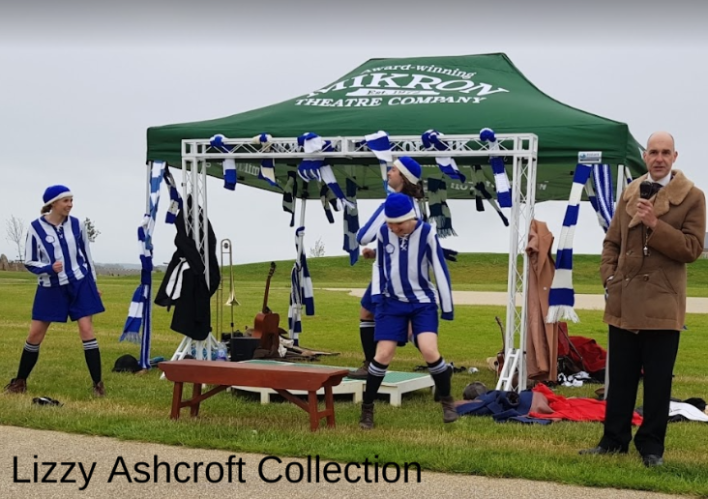
Rachel Benson, Thomas Cotran, Elizabeth Robin, James McClean - Corby June 1921, with James channelling his inner ‘Motty’. Directed by Margaret McNamara and Written by Amanda Whittington. Source: Lizzy Ashcroft Collection
Atalanta Ladies Football Club
Saturday 19th June 2021, found me in a windswept outdoor amphitheatre in Corby watching four talented actors remember a Huddersfield women’s football team who rose to fame 100 years ago. The play was clever, informative, witty, amusing, thought provoking, highly entertaining and very emotional. It was especially so for me as my famous granny, Lizzy Ashcroft, who had a 15-year international football career, played only her third ever game against Atalanta.
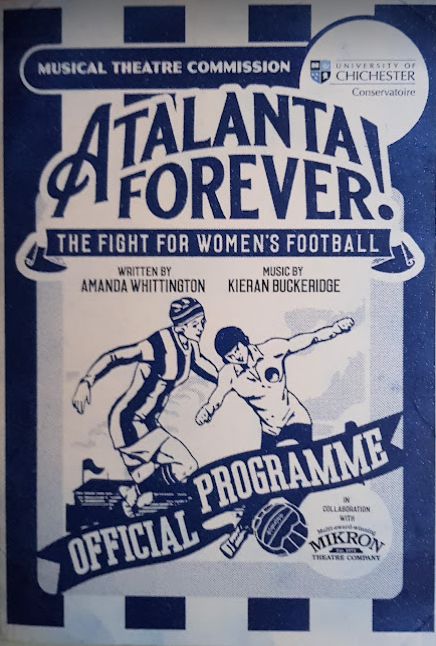
Programme - Hawth Theatre, Crawley. Source: Lizzy Ashcroft Collection
The Fight for Women’s Football
The play Atalanta Forever was recently updated, adapted and staged in the Hawth Theatre, Crawley. Amanda Whittington’s show was re-imagined for a two night run in March 2022. I went to see this new adaptation with my friend Michelle Crane, actor, writer and producer of the Short Film ‘Granny’. Marianne McNamara directed again and Kieron Buckeridge’s ten songs plus ‘Abide With Me’, ‘Jerusalem’, and so on, featured a new cast of nine young female actors. The show was a triumph.
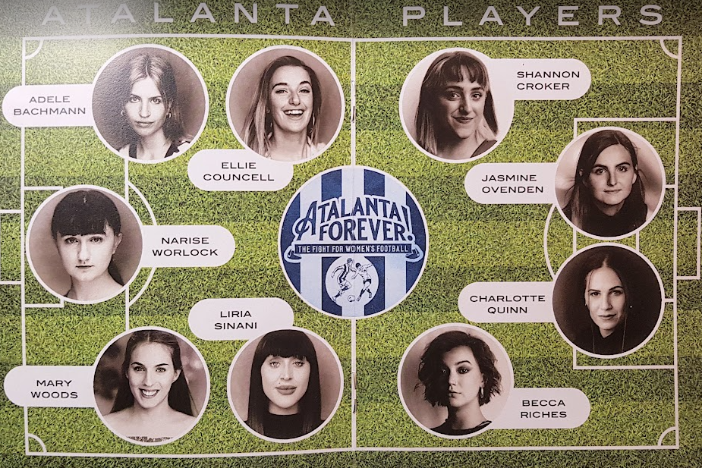
Cast - Atalanta Forever - Hawth Theatre Programme. Source: Lizzy Ashcroft Collection
Just why did Atalanta Ladies FC form in 1921?
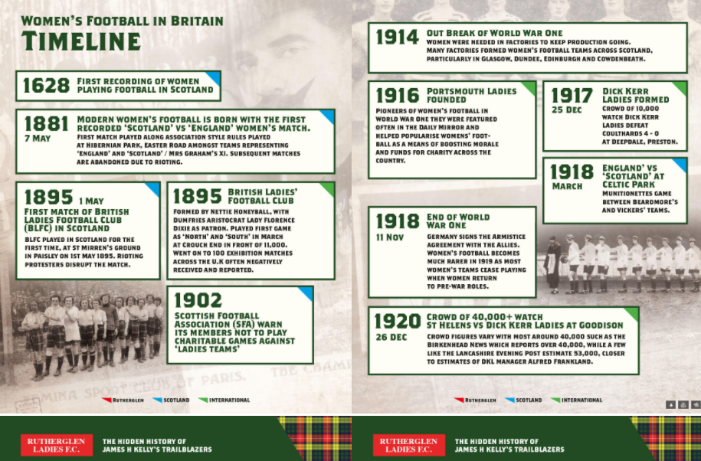
Some Key Moments in Women’s Football Development. Source: Steve Bolton and Fiona Skillen
Rutherglen Ladies F.C. Exhibition 2021-2023. Courtesy of Scottish National Football Museum, Hampden
Key Seasons
The ‘Key Seasons’ for women’s football were the 1917-1918 ‘War Season’ and the 1920-1921 ‘Golden Season’. Women’s football was played early in World War One with the Portsmouth Ladies being championed by the Daily Mirror for playing patriotic matches against wounded tommies and servicemen with their arms tied behind their backs. However, the enormous growth in women’s football did not happen until the 1917-1918 season when large numbers of young women became embedded in heavy industry and the incredible need for charity funds coincided. By the summer of 1918 (i.e. after the 1917-1918 season and before the 1918-1919 season), the end of the war was in sight and women’s football was less common and many teams folded. Some teams such as the Sterling Ladies of Dagenham (‘The Dagenham Invincibles’) and the Dick Kerr Ladies of Preston managed a full 1918-1919 season but most didn’t. Overall, 1919 was not a good year for women’s football.
1920-21 - 'The Golden Season'
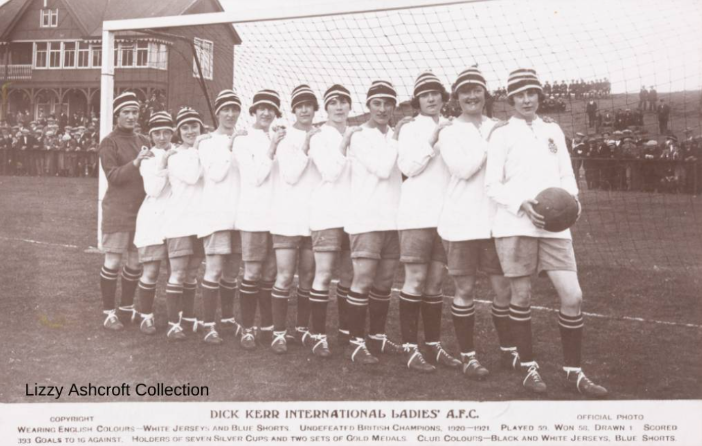
1921 - The Famous Dick Kerr Ladies ‘British Champions’ Postcard. Source: Lizzy Ashcroft Collection
1920-1921 - Exponential Growth
Football was played in the 1919-1920 season. However, most of the high profile games were in the industrial North West and associated with the industrial war sides. The Dick Kerr Ladies first five games that season were against the ‘Liverpool Ladies’ who were an iteration of the Aintree Filling Factory No.2 Munitions Factory side. Similar games were played later in the season against St Helens, Bolton and Cheshire. One extremely significant development in this season was the first ever tour by a French football team. Although they only played four games at the end of the 1919-1920 season (in April) in Preston, Stockport, Manchester and Chelsea, the large crowds 22,000, 15,000, 3,000 and 10,000 respectively and the media frenzy made playing women’s football a very attractive proposition. It was patriotic, raised money for very needy and deserving causes such as wounded ex-servicemen and provided mostly working class girls with a very attractive lifestyle. Towards the end of the 1919-1920 season, a group of women swimmers and rowers in Bath decided to form a football team but were unable to organise any high profile games until the following season. The 1920-1921 season was when teams sprang up all over the country. It is worth noting that Alfred Frankland, the manager of the Dick Kerr Ladies, had a very clever policy of spreading football to areas without teams and Yorkshire was one of the places where he concentrated his efforts.
Game 1
Atalanta vs Bath Ladies FC
15,000 at Leeds Road, Huddersfield
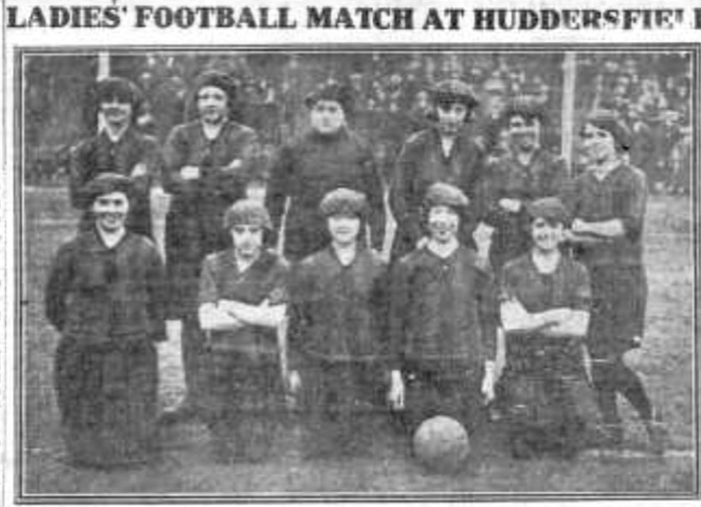
Huddersfield Atalanta in their Gold and Navy Blue Strip. Source: British Newspaper Archive, Leeds Mercury, Saturday 26 March 1921, Page 7
Atalanta Ladies FC 1 v 0 Bath Ladies FC
After several practice matches and lots of training the first high profile game for the Atalanta Ladies was against the newly formed Bath Ladies. This was only the third game for the Bath Ladies who faced enormous challenges given their geographical location. This game can almost certainly be attributed to the fact that their trainer was the famous Huddersfield Town player Charlie Slade, who won the FA Cup with Huddersfield in 1922. Atalanta player Miss Broadhead must have been very proud to score the winning goal in a close game. The fact that the game was played on Good Friday attracted a good crowd and a large sum was raised for ‘local charitable purposes’.
The fact that the game was played on Good Friday also attracted criticism from a religious point of view. Constance Waller (describing herself as ‘Chairman’) wrote a reply to ‘AG’ of Bath and I have reproduced the extremely witty letter below.
Letter by the Great Constance Waller
“It is by doing such things that women grow old”
To The Editor, “Bath Weekly Chronicle”
Sir - Our Mayor has handed me a letter from “AG” of Bath, enclosing a cutting of a letter written to the “Chronicle” by the same person. I hope you will allow me, as one of the Huddersfield players, to give my view in your paper, too. “AG” objects to anyone showing themselves so deficient in Christian reverence as to kick a ball during the most solemn hours of Good Friday. I have always understood (I am quite young and may be wrong) that the most solemn hours of Good Friday are in the morning, when you go church, and at tea time when you eat hot cross buns. Now, we are not desecrating either of these by having our match at quarter past five. If any workmen come straight from their work to the match (as I hope they will) I am sure they will relish their hot cross buns more after seeing a good game of football. I hope that none of our prospective crowd will stay away from Church in the morning to prepare themselves for our great event, as I should hate for the churches to be less well attended than they are at present.
I haven’t yet asked the Vicar of Huddersfield, but I am quite sure that if it is convenient for him Canon Tupper-Carey will be one of the first to book his seat in advance for the match. We are very proud of our Vicar in Huddersfield. We like our Mayor, too, because he is a thorough sport, and is doing all he can to help us. He has bought tickets for himself and his family for the match.
What will “AG” do on Good Friday? Will she make cakes and clean up, or will she sit piously and do nothing.? If she will sit and do nothing, very well. The state of being able to do nothing while there is a football match to be seen is incomprehensible to me - but I should not dream of abusing people because they do not find satisfaction in it. My mother, and most of the women I know, will be making hot cross buns and cleaning up on Good Friday. It is by doing such things that women grow old. We, whilst we are young, are laying in a stock of energy and good health for the days when we shall have to do that kind of thing.
In her letter to our Mayor “AG” asks the original and startling question, “what are women coming to in these days?” Really, I don’t think the Mayor knows any more than I do. One might just as well say “what is the world coming to?” It is a question of opinion. But I am quite sure of one thing, and that is by playing football and other sports we are coming into a new age physically. When all girls realise the great pleasure playing football and cricket gives there will be less girls spending their time idly walking the streets or reading sticky novels. Our football girls have practice once a week, physical drill and running two nights a week, and a walk on Sundays, and they will soon be able to play football and cricket in the evenings. Add to this the household and personal duties which most of them have and it doesn’t leave much time in which Satan can find work to do does it?
Now, I hope “AG” is quite shocked; but do you know, Mr Editor, I am sure she is a nice kind person and on Good Friday I would just like to have her here so I could shake her up; escort her to the football ground, make her stand up and cheer when the Bath team score a goal; send her home in a char-a-banc full of football enthusiasts; give her tea of buttered hot cross buns, and make her talk about the match with other spectators until she either quarrelled with them or fell asleep.
Constance M. Waller
Chairman, Atalanta Football Club
15, Dorset Street, Birkley, Huddersfield.
Source: BNA Bath Chronicle - Saturday 12th March 1921
The Great Constance Waller
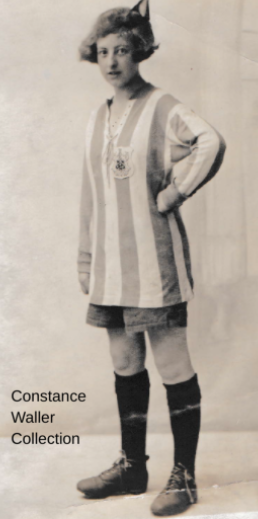
Feminist, Pioneer, Journalist, Footballer - Constance Waller. Source: Courtesy Constance Waller Family
Conclusion to Part 1
In Part 1, I hope that I have captured just how Atalanta Ladies FC burst onto the women’s football scene halfway through the 1920-1921 ‘Golden Season’. This group of women footballers, led by the articulate and determined Constance Waller obviously thought that they had a very bright future before them! Women’s football was reaching its zenith with teams being formed across the land on a daily basis. Their obvious opposition target was the world famous Dick Kerr Ladies, but before that came a much sterner test than the Bath Ladies in the form of St Helens Ladies FC. The legendary St Helens team were second only to the Dick Kerr Ladies and had never lost to another team. How would Constance and Atalanta fare against my granny and mates in only her third ever football game? Find out in Part 2 of this series of articles.
My thanks to the incredible team at Huddersfield Town Supporters Association (HTSA). My thanks to Marianne McNamara and the team at the Mikron Theatre. My thanks to Paul Ackerley at the University of Chichester Conservatoire and the team at the Hawth Theatre. My thanks to Amanda Whittington for her wonderful writing - Atalanta Forever!
Biography
Steve Bolton researches and writes about the history of women’s football. He is a member of the British Society of Sport History. Steve has published a number of blog articles and is the Custodian of the Lizzy Ashcroft Collection. Steve has credits on the short film ‘Granny’ as Producer and Historical Researcher. He was awarded a BSc (Hons) in Mathematics from University College London and a Post Graduate Certificate in Education from the University of Nottingham. Steve’s Twitter handle is: @STEPHEN11981196 and he can be contacted via email at: lizzyashcroftfootballer@gmail.com



/prod01/wlvacuk/media/departments/digital-content-and-communications/images-2024/Simmi-Sahota-degreeshow-thumbnail.png)
/prod01/wlvacuk/media/departments/digital-content-and-communications/images-2024/250630-SciFest-1-group-photo-resized-800x450.png)
/prod01/wlvacuk/media/departments/digital-content-and-communications/images-18-19/210818-Iza-and-Mattia-Resized.jpg)
/prod01/wlvacuk/media/departments/digital-content-and-communications/images/Maria-Serria-(teaser-image).jpg)
/prod01/wlvacuk/media/departments/digital-content-and-communications/images-2024/241014-Cyber4ME-Project-Resized.jpg)
/prod01/wlvacuk/media/departments/digital-content-and-communications/images-18-19/210705-bric_LAND_ATTIC_v2_resized.jpg)